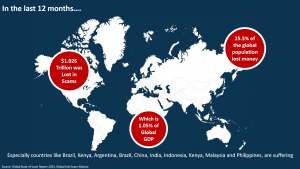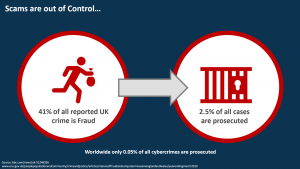In the ever-evolving digital landscape of our times, the internet has firmly entrenched itself as an indispensable facet of our existence. It serves as a means of communication, a source of entertainment, and a platform for convenient shopping and much more. However, the convenience of this online realm has also paved the way for a troubling predicament – online scams. These fraudulent schemes have the potential to inflict financial harm, emotional distress, and even the theft of one’s identity. In the midst of this burgeoning menace, the immediate need for collaborative solutions arises, bringing diverse stakeholders together in a concerted effort to eliminate online scams.
The Growing Threat of Online Scams
Online scams come in various forms, including phishing emails, fraudulent websites, identity theft, and more. The scammers are often skilled at deceiving individuals, making it difficult for the average person to distinguish between a legitimate opportunity and a scam. The consequences of falling victim to online scams can be devastating. The Global State of Scams Report provided by the Global Anti-Scam Alliance saw financial losses of world citizens of $1.026 trillion in 2023.

Stakeholders in the Fight Against Online Scams
The fight against online scams is not the responsibility of one group alone. It requires a collective effort from various stakeholders, including:
- Individuals: Internet users need to be educated about online scams, learn to recognize red flags, and take steps to protect themselves from falling victim to scams.
- Government: Governments can play a vital role by enacting and enforcing laws that target online scammers. They can also support public awareness campaigns and provide resources for reporting scams.
- Law Enforcement: Specialized units within law enforcement agencies can investigate and prosecute online scammers. However, they require cooperation from other stakeholders to gather evidence and locate perpetrators.
- Tech Companies: Internet service providers, social media platforms, and online marketplaces must actively combat scams on their platforms. They can use advanced technology to detect and block fraudulent activities.
- Financial Institutions: Banks and financial institutions can improve their fraud detection systems to identify and halt transactions related to online scams.
- Non-Governmental Organizations (NGOs): NGOs can raise awareness about online scams, offer support to victims, and advocate for stronger consumer protection.
Collaboration: The Key to Eradicating Online Scams
Collaboration is the linchpin in the fight against online scams. A united front can yield better results in several ways:
- Information Sharing: Stakeholders can share data and intelligence to track and apprehend scammers more effectively. When law enforcement agencies, tech companies, and financial institutions cooperate, they can identify patterns and trends that might otherwise go unnoticed.
- Public Awareness: A collaborative effort can create more impactful public awareness campaigns. These campaigns can inform the public about common scams, red flags, and best practices to stay safe online.
- Legislation: Governments can draft and pass legislation that specifically addresses online scams, but they need input from experts in the field, including tech companies and consumer protection advocates.
- Reporting and Response: The creation of a centralized platform or portal where individuals can report scams can streamline the process of collecting data on scams. This data can then be used for analysis and enforcement.
- Technological Solutions: Tech companies can develop and share advanced tools and technologies to identify and block scams. Collaboration allows for the creation of more effective anti-scam mechanisms.
Netsweeper as Part of a Collaborative Solution
Netsweeper can support the pivotal role of fostering collaborative solutions to combat online scams. With its centralized platform and advanced filtering, it provides a secure space for stakeholders, including individuals, government agencies, law enforcement, tech companies, and financial institutions, to converge and communicate. By facilitating real-time data sharing and intelligence exchange, Netsweeper empowers a unified front against online scams. This collaborative framework not only enhances digital defenses but also enables stakeholders to collectively strategize and respond effectively to the evolving landscape of online threats.

The Need for a Collaborative Solution
The fight against online scams is an urgent matter, and it requires a collective effort from individuals, governments, law enforcement, tech companies, financial institutions, and NGOs. Collaboration is the key to success in eradicating online scams. A centralized platform that brings together these stakeholders can significantly enhance their collective ability to detect, prevent, and prosecute scammers while raising awareness and supporting victims. By working together, we can make the internet a safer place for everyone.
To hear more about how Netsweeper can help with Online Scams check out our podcast with Jorij Abraham of the Global Anti-Scam Association; The Rise of Digital Deception: How to Safeguard Yourself in the Digital Age.
